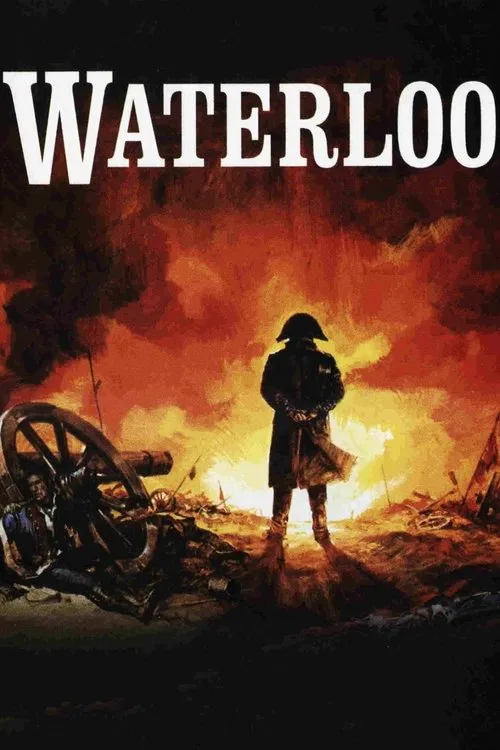Waterloo

Plot
In the climactic final battle of the Napoleonic Wars, the city of Waterloo was the stage for a monumental confrontation between two of the greatest military minds of all time: Napoleon Bonaparte, the French Emperor, and the Duke of Wellington, the British commander-in-chief. The stakes were high, not just for the fate of Europe, but also for the fate of an empire. The year was 1815, and the continent was still reeling from the aftershocks of Napoleon's exile on the island of Elba, a remote and rocky outcrop in the Mediterranean. After his initial defeat at the Battle of Leipzig in 1813, Napoleon was forced to abdicate the French throne, and he was exiled to Elba, where he spent a year in relative obscurity, plotting his return. But Napoleon was a force to be reckoned with, and he soon managed to escape from Elba and return to power in France, marking the beginning of the Hundred Days campaign. The French army, still loyal to its former leader, swung back into action, joining forces with Napoleon and declaring their allegiance to the Emperor once more. Meanwhile, the Duke of Wellington, the British commander-in-chief, was preparing for the inevitable showdown with Napoleon. Having proven himself to be one of the greatest generals of the Napoleonic Wars, Wellington had a reputation for strategic brilliance and tactical acumen. He had already defeated Napoleon's best generals in Spain and Portugal, and he was confident in his ability to beat the French Emperor himself. As the two armies faced off at Waterloo, the stage was set for a battle that would decide the fate of Europe. Wellington's Anglo-Allied army, consisting of British, Dutch, and German troops, was positioned on a series of ridges and hills overlooking the city of Waterloo, a small Belgian town that had become the focal point of the conflict. Napoleon's army, meanwhile, was arrayed on the opposite side of the battlefield, its soldiers armed and ready for battle. The French army was a formidable force, with some of the best troops in Europe under its command. Its artillery, led by the brilliant General Grouchy, was among the most advanced in the world, and its cavalry, led by the dashing General Ney, was one of the most feared on the battlefield. As the battle began, the two armies clashed in a series of bloody and chaotic skirmishes. The British artillery, led by General Sir Thomas Picton, opened fire on the French lines, causing chaos and destruction among the enemy ranks. But Napoleon's army was far from defeated, and it retaliated with a fierce counterattack, driving the British back and forcing Wellington's troops to regroup. The battle raged on for several hours, with both sides suffering heavy casualties. The British army, however, was beginning to gain the upper hand, thanks in large part to the bravery and leadership of its soldiers. The Scots Greys, a legendary cavalry unit, charged into the fray, sending the French cavalry reeling. The British infantry, meanwhile, held firm against the French onslaught, refusing to yield an inch. As the sun began to set on the battlefield, Napoleon became increasingly concerned. His army was taking heavy losses, and his supplies were running low. He ordered his generals to launch a final, desperate assault on the British lines, but it was too late. The British army was too strong, and the French army was too weak. In the end, it was Napoleon's own cavalry that proved to be the decisive factor in his defeat. As the French army advanced on the British lines, the British cavalry, led by General Lord Uxbridge, charged into the fray, sending the French cavalry flying. The British infantry, meanwhile, held firm, driving the French back and inflicting heavy casualties. As the battle drew to a close, Napoleon realized that he had lost. His army was defeated, his supplies were running low, and his generals were in disarray. He ordered his troops to withdraw from the battlefield, but it was too late. The British army had won the day, and Napoleon's reign was at an end. The defeat at Waterloo marked the end of Napoleon's empire and the beginning of a new era for Europe. The British army had emerged victorious, and its commander-in-chief, the Duke of Wellington, was hailed as a hero. The French army, meanwhile, was in disarray, its soldiers shocked and demoralized by their defeat. As for Napoleon, he was forced to abdicate the French throne for a second time, this time permanently. He was exiled to the remote island of Saint Helena, where he would spend the remainder of his days in exile. But even in defeat, Napoleon's legacy lived on, as a reminder of the power and complexity of the Napoleonic era, and the enduring impact of his vision for a unified Europe.
Reviews
Recommendations




